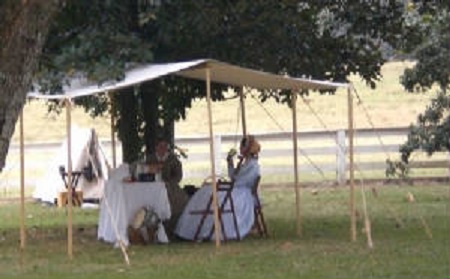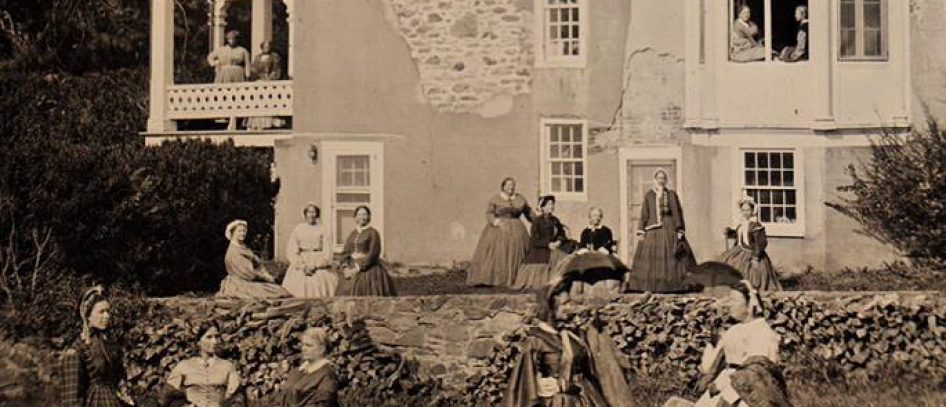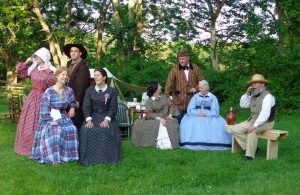Your decision whether to join a Civil War living history group or be independent will have some effect on your impression and the clothing you will need as most groups have some kind of authenticity standards and impression guidelines that members are asked to adhere to. If you are dead set on a particular impression, you will need to be aware of what your affiliation choices are and if those choices support your reasons for becoming involved in Civil War living history.
If you are new to the hobby, being part of a group can be beneficial. A group can provide mentors to help you reach the level of authenticity you are aiming for by offering advice and pointing you toward resources. A group can also provide you with event information and/or invitations you may not otherwise receive. Once at an event, a group can give you “a home”—somewhere to “hang out”, a place to camp and/or a group with whom to participate in living history scenarios. A group can also serve as a network to meet other living historians in your area.
When looking for a group there are several things you may want to consider:
What is the main goal of the group? Public education, living history, social club, heritage group? Does it match your reasons for becoming involved in living history?
What type of events does the group attend? Do they attend the type of events you want to participate in?
What is the level of civilian activity within the group?
Do civilian and military members interact at events? Will it bother you if you do not see the military members until after the event is over?
Are families welcome?
Are single women welcome?
Are male civilians welcome or are they expected to participate as military?
How stringent are the authenticity standards? Do the authenticity standards match what you are looking for in living history?
How structured is the group? Are there officers or is it an informal group? Are civilian members eligible to hold office?
Is there a minimum event attendance requirement for membership? Is it a reasonable goal for you to meet?
Is there a dues requirement? Is it affordable for you?
Is there a time limit in which you must meet any authenticity standards? Is it a reasonable goal for you?
Does the group portray a particular military unit, state or region or do they have several different impressions depending on the needs of the event?
Does the group impression(s) include any you are not willing to participate in?
Are there diverse civilian impressions or does the group have a particular civilian impression?
Some groups post their event schedules on their websites; you may want to attend an event as a spectator and visit with a group(s) to see if a particular group is for you. You can find Civil War era reenactment and living history groups through the internet on Facebook, the various hobby forums and list serves and in hobby publications.
Being Independent
Another option is to participate in living history as an independent with no official affiliation with any particular group. As an independent, you meet your own standards of authenticity and event participation rather than a group’s. You will need to do your own research to find events you want to attend and to reach the authenticity level you want to obtain. You will also want to participate on the various hobby forums and list serves to network with other living history participants. This website can help you with some of that research.
You will need to develop your own impression(s) as there is no group impression to direct you. This may take a bit more research depending on how in depth you want to go and what is expected at the events you attend. Also, since there is no group activity, you will want to develop activities that you can do independently at events.
Being an independent does not mean going alone, however; several events offer opportunities for independent civilians to participate in living history scenarios with other event participants either directly or intermittently throughout the event. Contact the event organizers ahead of time and ask if there are any civilian scenarios planned and how you can participate.
It is also possible to participate in both worlds—be a member of a group and still have a certain level of autonomy, attending events and participating in activities outside any group you may belong to. As you participate in the hobby you may find that you have outgrown the group and/or impression you started with. Don’t feel you are locked into one way of participating or you must remain with the same group you started with. The best way to participate in this hobby is the way that makes it fun for you.
Following are links to a few civilian living history groups.
Chattahoochee Refugee Society
Their mission is to represent history by the highest standards, educating by giving an authentic representation of women and their various roles in the 19th century. They focus on the yeoman class, interpreting the average woman as a productive member of the farming communities of North Georgia and Middle Tennessee.
Historical Citizens Association
An educational organization comprised of living historians dedicated to portraying authentic citizens of the past. Their main area of focus is the American Civil War.
Historical Timekeepers
We are a local Wisconsin civilian re-enacting group that was formed in 2002, with the purpose of reaching out to people whose purpose was to portray life at the home front during the Civil War. We have over 50 active members and continue to grow!
Living History Society of Minnesota, Inc
The main focus for LHS activities centers on the final days of territorial government, through Minnesota’s early statehood (1858) to the end of the Civil War (1865).
Mackinaw River Valley Civil War Civilian
This site is devoted to researching, creating, and demonstrating accurate impressions of civilians from Central Illinois during the 19th century. All interested parties are welcome to learn from these pages. Every attempt is made for historical accuracy while enjoying the recreations, making new friends, and teaching others about the roles of civilians from Illinois in the 19th century. The purpose is to learn and grow with tolerance, guidance, and understanding.
Star of the West Society
An informal organization of women and men who live in the Central Mississippi Valley, and who strive toward authenticity in civilian impressions of the mid-1850s through 1865. Their goals include setting up a central clearing house for research about the mid-nineteenth century “west,” including Illinois, Indiana, Iowa, Kansas, Missouri, Nebraska, and other western states and territories. They want to help men, women, and children attain higher standards in their civilian impressions, and to disseminate plans for living history events, workshops, field trips, and educational experiences. They are dedicated to bringing alive the unique history of their region.

